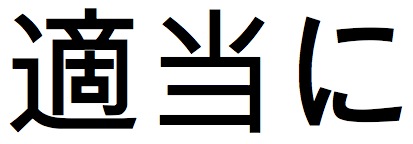
Blue Shoe over at Just Another Day in Japan has a nice little post about his experience with the word 適当に. It’s cool to read as he gets closer and closer to the meaning and then nails the definition almost without realizing it. It’s not his fault, though, since this word gets defined obscurely in just about every dictionary ever created.
He gives the standard dictionary definition of “appropriately” or “properly” when a yakitori chef says, 適当にしましょうか. At first Blue Shoe thinks it might refer to a set meal, but there is none on the menu. His second guess is right on the money:
Either that or he was offering to just let us buy whatever he felt like making. Sometimes the problem in these cases is that you really have no idea what “properly” or “appropriately” means.
There it is in bold – the chef was exercising his subjective choice when performing the action of choosing and cooking delicious chicken bits. Less eloquently, 適当に means “do something however the fuck you/I want to.” It’s not exactly that rough in every case – especially this one which is probably closer to “So should I just rustle up some stuff for y’all to grub on?” – but it’s definitely that arbitrary. A good comparison might be an お任せ course at a sushi place, although if お任せ is A level, then 適当に is like B- level.
One of the best examples is when someone delegates work but can’t be bothered to specify how that work should be done. They usually tell the person to 適当にやって or 適当にしてもいい. Something along those lines. Plug in my profane example and you get the extreme end of the spectrum (imagine an angry boss yelling this): “Do it however the fuck you want!” The other end of the spectrum is “Do it however you see fit” or “However you see suitable.” This is where the “appropriate” and “proper” come in to play.
In a Japanese dictionary, the first listing is “Done well so that the action meets certain conditions, goals or requirements. Something that fulfills something. Something appropriate. Something with those characteristics.” Because the decision-making is subjective, however, the word can also take on negative meanings if the doer happens to choose standards that are inappropriately low.
No matter how you look at it, it’s tough to gather the meaning from the words “appropriate” and “properly” alone. I definitely remember wrestling with the meaning of 適当に. This one takes some getting used to.

Pingback: Tweets that mention How to Japonese» Blog Archive » Cool Compound – 適当に -- Topsy.com
Haha…that’s perfect – I love that definition: \however the fuck you/ I want.\
At the first company where I worked in Japan, I was given a list of instructions for speaking to clients on the phone. I can’t remember the wording of the entire phrase, but the one that struck me most was about how to answer a demanding client, and it ended 適当にしないでください。
With my textbook Japanese I initially misinterpreted it as “do not act appropriately” but quickly realized that made no sense–what it meant was “don’t just say/promise whatever in order to get them to shut up” and, by extension and in the context of the full list, “if you don’t know something, tell the client you will get back to them and then check with your manager.”
Yeah, they never seem to explain this one well in class, and dictionaries never do it justice… defining it as “appropriate” gives most people just about the opposite impression of how it’s normally used.
Another word that got me was 気まぐれ, which when you look it up in a dictionary comes up as whimsical or fickle. That’s all find and dandy, until you see a 気まぐれ pizza on the menu. Whimsical pizza, wtf? (PS: in food terms it basically just means mixed, so it’s a mixed pizza with lots of different stuff)
Casey from facebook: Doesn’t 適当に basically amount to a less coarse version of 勝手に?
Yeah, good point. 勝手に more specifically addresses the doer’s motive (selfish), whereas 適当に to me seems to speak to the status of the completed action. If that makes sense…
Nice post on an awesome word. I always think of tekitou as pretty friendly, in the sense of being told 適当でいいよ − which I take as “don’t fuss over it too much – it’s fine.” This is such a refreshing sentiment in Japan, especially when it starts to feel like fussing over stuff is a national pastime.
All above interpretations are quite 適当です。However, the blog author misses a vein of meaning quite expected of a non native. That is that when a boss gives this “適当にやれ.” command, there is this unspoken, “ The effort employed in accomplishing this task will tell me how serious you are about your work!” Of course, each worker must be in tune with the boss to know exactly what 適当 is meant.
Pingback: Japanese Adverb POWER RANKINGS | How to Japanese